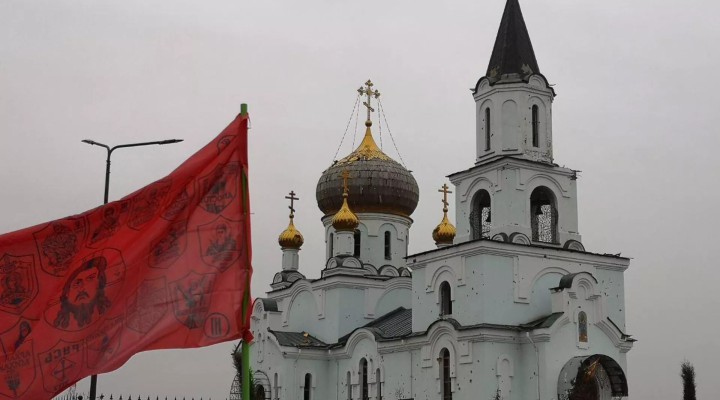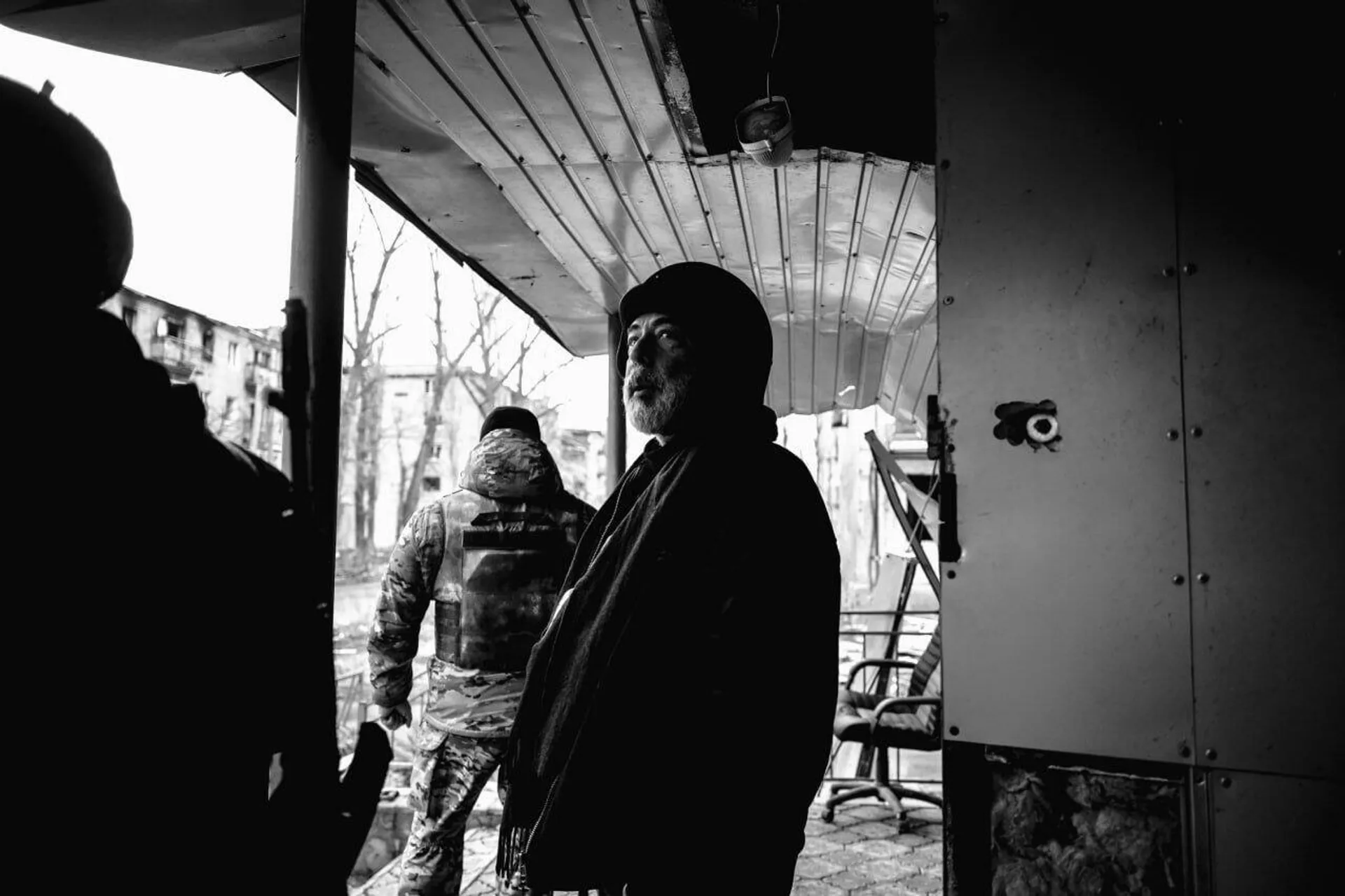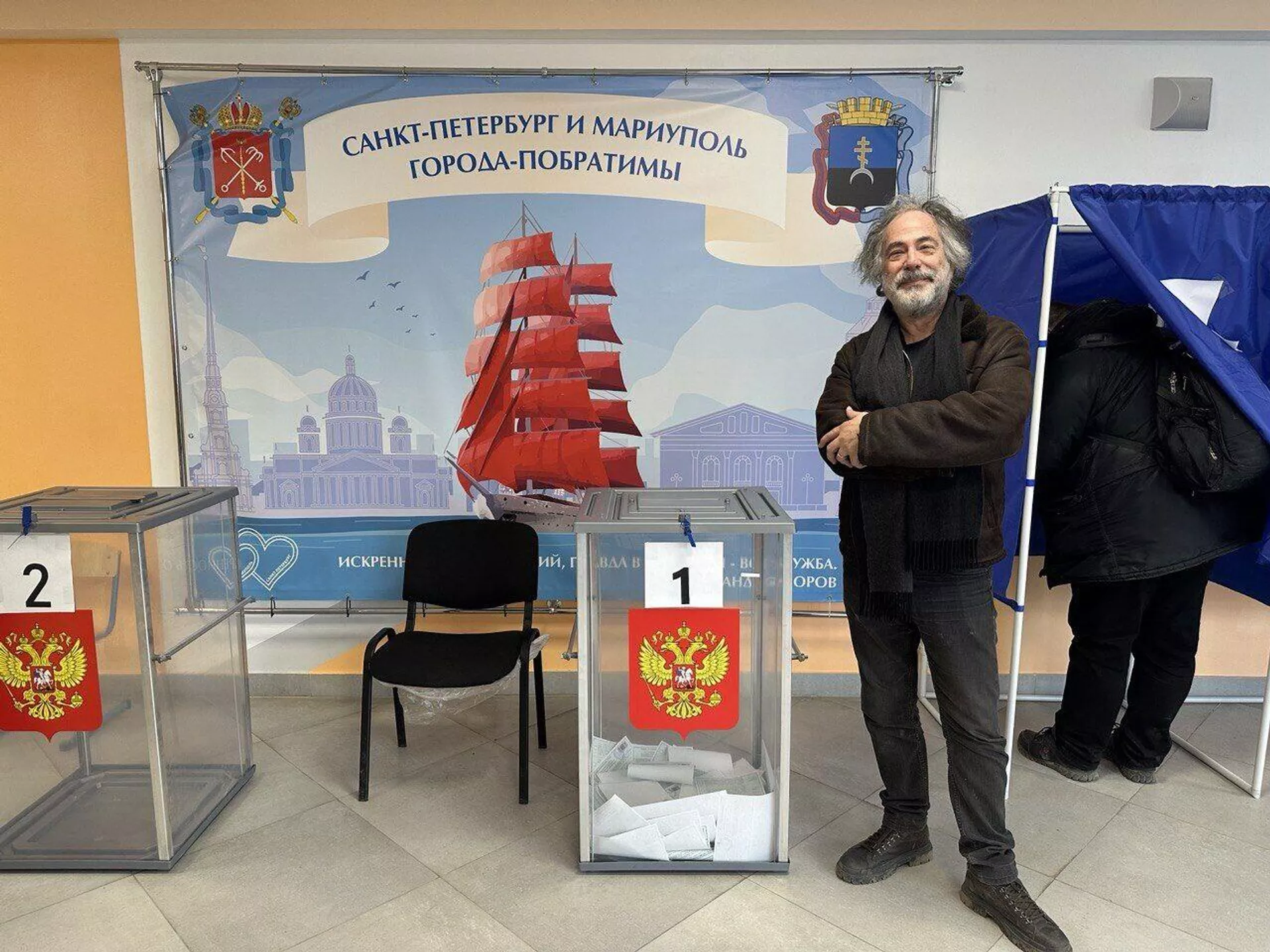Donetsk, Avdeyevka, Mariupol – on the Road in Electoral Donbass

They have waited 10 long, suffering years to vote in this election. And vote they did, in massive numbers, certifying a landslide reelection for the political leader who brought them back to Mother Russia. VVP may now be widely referred to as Mr. 87%. In Donetsk, turnout was even higher: 88,17%. And no less than 95% voted for him.
To follow the Russian electoral process at work in Donbass was a humbling – and illuminating – experience. Graphically, in front of us, the full weight of the collective West’s relentless denigration campaign was instantly gobbled up by the rich black soil of Novorossiya. The impeccable organization, the full transparency of the voting, the enthusiasm by polling station workers and voters alike punctuated the historical gravity of the political moment: at the same time everything was enveloped in an impalpable feeling of silent jubilation.
“This was of course a referendum. Donbass represents a microcosm of the solid internal cohesion of Russian citizens around the policies of Team Putin – while at the same time sharing a feeling experienced by the overwhelming majority of the Global South. VVP’s victory was a victory of the Global Majority.”
And that’s what’s making the puny Global Minority even more apoplectic. With their highest turnout since 1991, Russian voters inflicted a massive strategic defeat to the intellectual pigmies who pass for Western “leadership” – arguably the most mediocre political class of the past 100 years. They voted for a fairer, stable system of international relations; for multipolarity; and for true leadership by civilization-states such as Russia.
VVP’s 87% score was followed, by a long shot, by the Communists, with 3.9%. That is quite significant, because these 91% represent a total rejection of the globalist Davos/Great Reset plutocratic “future” envisioned by the 0.001%.
Avdeyevka: Voting Under Total Devastation
On Election Day Two, at section 198 in downtown Donetsk, not far from Government House, it was possible to fully measure the fluidity and transparency of the system – even as Donetsk was not spared from shelling, in the late afternoon and early evening in the final day of voting.
Afterwards, a strategic pit stop in a neighborhood mini-market. Yuri, an activist, was buying a full load of fresh eggs to be transported to the nearly starving civilians who still remain in Avdeyevka. Ten eggs cost the equivalent of a dollar and forty cents.

At Yasinovata, very close to Avdeyevka, we visit the MBOU, or school number 7, impeccably rebuilt after non-stop shelling. The director, Ludmilla Leonova, an extraordinary strong woman, takes me on a guide tour of the school and its brand new classrooms for chemistry and biology, a quaint Soviet alphabet decorating the classroom for Russian language. Classes, hopefully, will resume in the Fall.
Close to the school a refugee center for those who have been brought from Avdeyevka has been set up. Everything is spotlessly clean. People are processed, entered into the system, then wait for proper papers. Everyone wants to obtain a Russian passport as soon as possible.
For the moment, they stay in dormitories, around 10 people in each room. Some came from Avdeyevka, miraculously, in their own cars: there are a few Ukrainian license plates around. Invariably, the overall expectation is to return to Avdeyevka, when reconstruction starts, to rebuild their lives in their own town.
Then, it’s on the road to Avdeyevka. Nothing, absolutely nothing prepares us to confront total devastation. In my nearly 40 years as a foreign correspondent, I’ve never seen anything like it – even Iraq. At the unofficial entry to Avdeyevka, beside the skeleton of a bombed building and the remains of a tank turret, the flags of all military batallions which took part in the liberation flutter in the wind.
“Each building in every street is at least partially destroyed. A few remaining residents congregate in a flat to organize the distribution of essential supplies. I find a miraculously preserved icon behind the window of a bombed-out ground floor apartment.”
FPVs loiter overheard – detected by a handheld device, and our military escort is on full alert. We find out that as we enter a ground floor apartment which is being kept as a sort of mini food depot – housing donations from Yasinovata or from the military – that very same room, in the morning, had been converted into a polling station. That’s where the very few remaining Avdeyevka residents actually voted.
A nearly blind man with his dog explains why he can’t leave: he lives in the same street, and his apartment is still functional – even though he has no water or electricity. He explains how the Ukrainians were occupying each apartment block – with residents turned into refugees or hostages in the basements – and then, pressed by the Russians, relocated to nearby schools and hospitals until finally fleeing.
The basements are a nightmare. Virtually no light. The temperature is at least 10 degrees Celsius lower than at street level. It’s impossible to imagine how they survived. Another resident nonchalantly strolls by in his bicycle, surrounded by derelict concrete skeletons. The loud booms – mostly outgoing – are incessant.
Then, standing amidst total devastation, a vision: the elegant silhouette of the Church of Mary Magdalen, immaculately preserved. Dmitry, the caretaker, takes me around; it’s a beautiful church, the paintings on the roof still gleaming under the pale sunlight, a gorgeous chandelier and the inner chamber virtually intact.
The Mariupol Renaissance
The final election day is spent in Mariupol – which is being rebuilt at nearly breakneck speed: the new railway station has just been finished. Voting is seamless at school number 53, housing district 711. A beautiful mural behind the ballot box depicts the sister cities St. Petersburg and Mariupol, with the legendary Scarlet Sails from the Alexander Green story right in the middle.
I revisit the port: international cargo is still not moving, only ships coming from the Russian mainland. But the first deal has been reached with Cameroon – fruits in exchange with metals and manufactured products. Several other deals with African nations are on the horizon.

The Pakrovska church, a Mariupol landmark, is being carefully restored. We are welcomed by Father Viktor, who hosts lunch for a group of people from the parish, and a fine conversation ensues ranging from Christian Orthodoxy to the Decline of the West and the LGBT agenda.
“We go to the roof and walk around a balustrade offering a spectacular 360-degree view of Mariupol, with the port, the destroyed Azovstal iron works and the Russian Sea of Azov in the deep background. The massive church bells ring – as in a metaphor for the resurrection of a beautiful city which has the potential to become a sort of Nice in the Sea of Azov.”
Back in Donetsk, going to a “secret” school/museum only 2 km away from the line of fire – which I first visited last month – has to be canceled: Donetsk continues to be shelled.
With Avdeyevka in mind, as well as the shelling that refuses to go away, a few questions on numbers pop up on the long 20-hour drive back to Moscow.
In Chechnya, led by uber-patriot Kadyrov, turnout was 97%. And no less than 99% voted for VVP. So, unlike in the past, forget about any ulterior attempt at a color revolution in Chechnya.
Same pattern in the Caucasus, in the region of Kabardino: turnout was 96%. No less than 94% voted for VVP.
Between Kazakhstan and Mongolia, in Tuva, turnout was 96%. And 95% voted for VVP. In the autonomous Yamal-Nenets, turnout was 94%. But VVP got “only” 79% of the votes. In lake Baikal, Buryatia had 74% turnout and 88% of votes for VVP.
The key, once again, remains Moscow. Turnout, compared to other regions, was relatively low: 67%. Well, Moscow is still largely Westernized and in several aspects ideologically globalist – thus more critical than other parts of Russia when it comes to the patriotic emphasis.
And that brings us to the clincher. Even with the resounding success of Mr. 87%, they will never give up. If there ever is a minor chance of a successful Hybrid War strategy provoking a color revolution, the stage will be Moscow. Quite pathetic, actually, when compared to the images of Mr. 87% saluted by a packed Red Square on Sunday like the ultimate rock star.
The Kremlin is taking no chances. Putin addressed the FSB and went straight to the point: attempts to sow interethnic trouble – as a prelude to color revolutions – must be strictly suppressed. The FSB will go for the next level: traitors will be identified by name and targeted without a statute of limitations.
After the electoral euphoria, no one really knows what happens next. It has to be something hugely significant, honoring the historical VVP electoral landslide. He has carte blanche now to do anything. Priority number one: to finish once and for all with the Hegemon-built terror mongrel that has been attacking Novorossiya for 10 long years.
 TheAltWorld
TheAltWorld 
Guy St Hilaire
Gods speed Vladimir Putin and congratulations on the final count .The Donbass has suffered long enough .